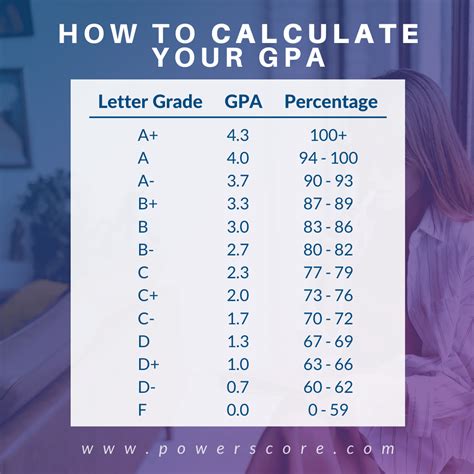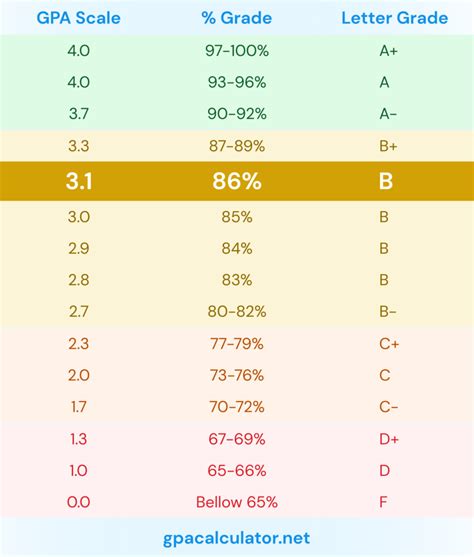Average High School Gpa

Understanding and calculating your high school GPA (Grade Point Average) is an essential aspect of your academic journey, as it plays a significant role in college admissions and future opportunities. In this comprehensive guide, we will delve into the world of high school GPAs, exploring what they are, how they are calculated, and most importantly, how you can determine your average high school GPA.
What is a High School GPA?

A high school GPA is a numerical representation of your academic performance throughout your high school years. It is calculated by considering the grades you receive in all your courses and assigning a corresponding numerical value to each grade. These numerical values, known as grade points, are then averaged to determine your overall GPA.
GPAs are typically used by colleges and universities as a primary criterion for evaluating a student's academic achievement and potential. A higher GPA often indicates a higher level of academic excellence and can open doors to a wider range of educational and career opportunities.
Understanding the GPA Scale

The GPA scale is a standardized system used to convert letter grades into numerical values. Here's a breakdown of the most common GPA scale:
| Letter Grade | Grade Point |
|---|---|
| A | 4.0 |
| A- | 3.7 |
| B | 3.0 |
| B- | 2.7 |
| C | 2.0 |
| C- | 1.7 |
| D | 1.0 |
| F | 0.0 |

It's important to note that some schools may use a slightly different GPA scale, such as a 5.0 or 9.0 scale, so it's always a good idea to check with your school's guidelines.
Calculating Your High School GPA

Calculating your high school GPA involves a few simple steps. Here's a step-by-step guide to help you determine your average GPA:
-
Gather Your Grades: Collect all your grade reports or transcripts from each semester or year of high school. This will provide you with the necessary information to calculate your GPA accurately.
-
Convert Letter Grades to Grade Points: Using the GPA scale mentioned earlier, convert each of your letter grades into their corresponding grade points. For example, an A would be converted to 4.0, a B to 3.0, and so on.
-
Calculate the Grade Points for Each Course: Multiply the grade point of each course by the number of credits or units the course is worth. This will give you the grade points earned for each course.
-
Sum Up the Grade Points: Add up all the grade points you calculated in the previous step. This will give you the total grade points earned throughout your high school career.
-
Calculate the Total Credits or Units: Determine the total number of credits or units you have taken in high school. This information should be available on your transcripts or grade reports.
-
Divide the Total Grade Points by the Total Credits: Finally, divide the total grade points by the total number of credits or units to obtain your average high school GPA. This number represents your overall academic performance.
Let's illustrate this with an example:
Suppose you have the following grades and credits for a particular semester:
| Course | Letter Grade | Grade Point | Credits | Grade Points Earned |
|---|---|---|---|---|
| English | A | 4.0 | 1 | 4.0 |
| Math | B | 3.0 | 1 | 3.0 |
| Science | A- | 3.7 | 1 | 3.7 |
| History | B- | 2.7 | 1 | 2.7 |
To calculate your GPA for this semester:
- Total Grade Points: 4.0 + 3.0 + 3.7 + 2.7 = 13.4
- Total Credits: 1 + 1 + 1 + 1 = 4
- GPA: 13.4 / 4 = 3.35
So, your GPA for this semester would be 3.35.
Average High School GPA

Now that you know how to calculate your GPA, you might be curious about what an average high school GPA looks like. The average GPA can vary depending on various factors, including the school, region, and the competitiveness of the student body. However, here's a general idea of what average GPAs may look like:
- National Average: According to some studies, the national average GPA for high school students in the United States is around 3.0 to 3.5.
- Regional Variations: GPA averages can differ significantly between states and regions. For instance, some states with more rigorous academic standards may have higher average GPAs.
- Competitive Schools: Selective colleges and universities often receive applications from students with GPAs above the national average, sometimes ranging from 3.5 to 4.0 or even higher.
It's important to remember that your GPA is just one aspect of your academic profile. Colleges and universities also consider other factors such as extracurricular activities, personal statements, and letters of recommendation. A well-rounded application can enhance your chances of admission, even with a slightly lower GPA.
Improving Your High School GPA

If you're aiming to improve your high school GPA, here are some tips to consider:
- Stay Organized: Keep track of your assignments, due dates, and exam schedules. Organization can help you manage your time effectively and reduce last-minute stress.
- Attend Classes Regularly: Consistent attendance ensures you don't miss out on important lessons and allows you to ask questions and clarify doubts.
- Take Advantage of Extra Help: If you're struggling with a particular subject, don't hesitate to seek help from teachers, tutors, or peers. Many schools offer study groups or tutoring sessions to support students.
- Manage Your Time Wisely: Prioritize your academic responsibilities and create a study schedule that works for you. Avoid procrastination and allocate dedicated time for each subject.
- Practice Active Learning: Engage with the material actively by taking notes, participating in class discussions, and reviewing your notes regularly. Active learning enhances your understanding and retention of the subject matter.
Remember, maintaining a high GPA is not just about getting good grades; it's about developing good study habits and a strong work ethic that will benefit you throughout your academic and professional journey.
FAQs

How do I calculate my weighted GPA?

+
Weighted GPAs take into account the difficulty level of courses. To calculate it, assign additional grade points to advanced or honors courses. For example, an A in an honors course might be worth 4.5 points instead of 4.0. Then, follow the same steps as for unweighted GPA calculation.
Can my GPA improve if I retake a course?

+
Yes, retaking a course can improve your GPA. When you retake a course, the new grade replaces the old one in your GPA calculation. However, some colleges may consider both grades, so it's important to check their policies.
Are extra-curricular activities considered in GPA calculations?

+
No, extra-curricular activities are not directly included in GPA calculations. However, they can enhance your college application and demonstrate your well-roundedness. Colleges often consider a combination of academic achievements and extra-curricular involvement.
🌟 Note: This guide provides a general overview of high school GPAs. For specific guidelines and calculations, consult your school's academic policies or seek assistance from your school's guidance counselor.
In conclusion, understanding and calculating your high school GPA is a crucial step in your academic journey. By following the steps outlined in this guide, you can determine your average GPA and take control of your academic performance. Remember, a high GPA is an excellent indicator of your dedication and hard work, but it’s just one piece of the puzzle when it comes to college admissions and future success.



